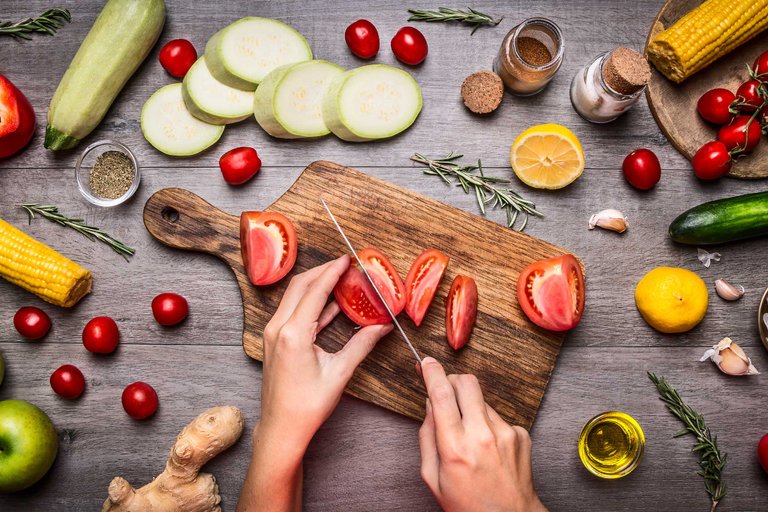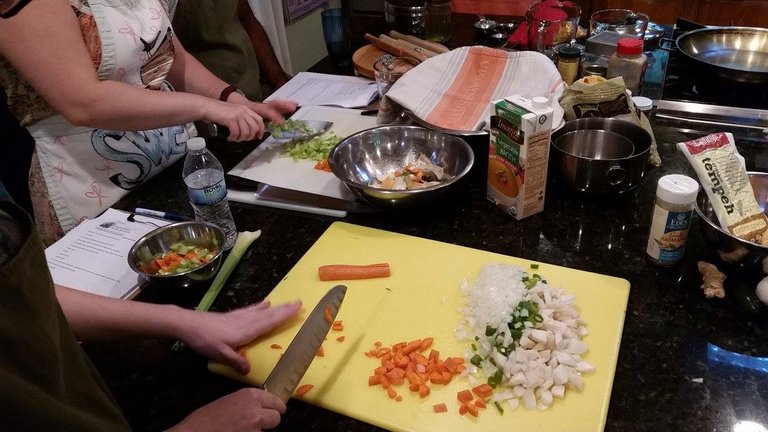A Health-Nut’s Guide to Summer Grilling
June 2018
By Susan Weis-Bohlen
As the seasons change so do our eating habits. The heavy stews and soups of winter make way to the fresh greens and lighter grains of spring, cooling fruits and local farmer’s market stands. While many can’t wait to get the grill out of the garage, fire it up and grill that hunk of meat, we’ll look at some delicious alternatives that all your family and friends will enjoy, and why you will want to avoid the meat.
First a note about grilling. Not to be a downer – I know some of you may think I take the fun out of some foods by pointing out their potential hazards – but there are some real dangers to high-heat cooking that you should be aware of. According to the National Institutes of Health, Heterocyclic amines (HCAs) and polycyclic aromatic hydrocarbons (PAHs) are chemicals formed when muscle meat, including beef, pork, fish, or poultry, is cooked using high-temperature methods, such as pan frying or grilling directly over an open flame. In laboratory experiments, these chemicals have been found to be mutagenic—that is, they cause changes in DNA that may increase the risk of cancer. HCAs are formed when sugars, and creatinine (substances found in muscle) react at high temperatures. PAHs are formed when fat and juices from meat grilled directly over a heated surface or open fire drip onto the surface or fire, causing flames and smoke.
The smoke contains hydrocarbons that stick to the surface of the meat. The NIH (National Institutes of Health) goes on to say that HCAs are not found in significant amounts in foods other than meat cooked at high temperatures, but PAHs can be found in other smoked foods, as well as in cigarette smoke and car exhaust fumes. So think about that next time you are standing over an open flame on the grill!
Over 800 studies have shown the link from eating a diet heavy in processed and red meats to a greater risk of several types of cancer, heart disease and a host of other chronic illnesses, according to The World Health Organization’s International Agency for Research on Cancer (IARC). The IARC found that the strongest evidence linked processed meats (such as hot dogs, beef jerky, bacon and ham) to colorectal cancer — with each hot-dog-size serving of processed meat eaten daily raising the risk by 18 % over a lifetime. The IARC also reports that 34,000 cancer deaths are caused around the world each year by diets high in processed meat. Acrylamide is another cancer-causing chemical. mostly found in high-carbohydrate foods, when cooked at high temperatures. The worst foods are fatty, well-done (and charred) beef, pork and lamb, but even poultry and fish produce HCAs when seared.
If that doesn’t change your mind about eating grilled meats, here are some tips to help you be a bit healthier: (From Berkley Wellness at The University of California)
• Choose lean cuts and trim any visible fat so that less fat drips during cooking.
• Marinate meat before you grill it. This can decrease HCAs by 60 to 90 percent, researchers have found. Use your own combinations of cider, citrus juices, vegetable oils, vinegar, mustard, herbs and spices, and even beer and wine. Sugars tend to increase HCAs, however, so watch out for commercial tomato or BBQ sauces that have a lot of added sugar.
• Precook meat in the microwave or oven, discard the juices, then finish on the grill.
• Use lower heat by waiting for the coals to burn less hot or by turning the gas down.
• Don’t place the meat directly over the coals: that way the fat won’t drip on them.
• Raise the grill rack farther from the heat.
• Flip the meat frequently to avoid charring, and grill just until the meat is cooked through and safe to eat. Use smaller pieces (like kabobs), which cook faster.
• Go vegetarian. When veggie burgers, tofu and vegetables are grilled, there is little or no formation of HCAs.
• Stay upwind from grills to avoid breathing in smoke, which also carries health risks. No smoke is good smoke.
Keep in mind: Pan-frying and broiling at high temperatures also produce HCAs. Instead, steam, poach, microwave, stew, roast or bake, when possible. Don’t consume the pan drippings, since they can be high in HCAs—and fat.
You can still enjoy that grilled flavor you love and reduce your cancer risk by swapping meat for veggies, veggie burgers, or fruit, all safer choices because HCAs and PAHs form in muscle proteins. And you probably already know this -- phytochemicals in colorful fruits and veggies reduce certain types of cancer. Try swapping out some meat dishes for these surprising choices!
Grilled Watermelon, from Mark Bittman, How to Cook Everything Vegetarian:
Grilling “sobers it up and makes it lose its sloppy sweetness,” of watermelon, writes Mark Bittman. He brushes 1-inch-thick slices with olive oil, minced onion, salt, and pepper, then grills them for about 5 minutes per side until caramelized and beginning to dry out. Serve as a side or top Bittman-style: with melted cheese and a bun for a “watermelon burger.”
Naturally Ella recommends: Spiced Sweet Potato Skewers with Cilantro Yogurt Sauce:
Skewers
1 pound sweet potatoes (peeled and cut into ½” thick half moons)
• 1 tablespoon olive oil
• 1 teaspoon chili powder
• ½ teaspoon ground cumin
• ½ teaspoon ground coriander
• ½ teaspoon smoked paprika
• ¼ teaspoon salt
• 1 medium red onion
Yogurt Sauce
• ½ cup whole milk plain yogurt
• ½ cup loosely packed fresh cilantro
• 1 tablespoon olive oil
• 1 tablespoon fresh lemon juice
• ¼ teaspoon salt
For Serving
• 2 cups cooked grains (for serving)
• Minced cilantro (for serving)
•
- Place a steaming basket in a large pot filled with ½” or so of water. Bring to a boil.
- Prep sweet potatoes: Peel, trim ends, and cut in half lengthwise. Cut each sweet potato half into ½” thick slices. Add the sweet potatoes to the steaming basket, cover, and cook until sweet potatoes are just-tender, 4 to 5 minutes. The skewer should easily pierce the sweet potato but not cause it to fall apart.
- Transfer the sweet potatoes to a bowl and toss with olive oil, spices, and salt. Let cool enough to handle.
- Light grill to medium heat. Cut onions into pieces similar in size to the sweet potatoes. Alternate sweet potatoes and onion slices on skewers.
- Place skewers on grill and cook, turning occasionally, until sweet potatoes have lightly charred on all sides, 8 to 10 minutes.
- While the skewers are grilling, combine the ingredients for the dressing in a blender. Puree until smooth and there are no large pieces of cilantro.
- Serve skewers over grains with a solid drizzle of the dressing and extra cilantro if desired.

